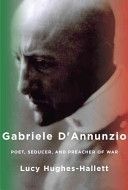Gabriele D'Annunzio (12 March 1863 – 1 March 1938), Prince of Montenevoso, was an Italian writer, poet, journalist, playwright and soldier during World War I. He occupied a prominent place in Italian literature from 1889 to 1910 and after that political life from 1914 to 1924. He was often referred to under the epithets Il Vate ("the Poet")[2]
After the start of World War I, D'Annunzio made public speeches in favor of Italy's entry on the side of the Triple Entente. Since taking a flight with Wilbur Wright in 1908, D'Annunzio had been interested in aviation. With the war beginning he volunteered and achieved further celebrity as a fighter pilot, losing the sight of an eye in a flying accident. In February 1918 he took part in a daring, if militarily irrelevant, raid on the harbour of Bakar (known in Italy as La beffa di Buccari, lit. the Bakar Mockery), helping to raise the spirits of the Italian public, still battered by the Caporetto disaster. On 9 August 1918, as commander of the 87th fighter squadron "La Serenissima", he organized one of the great feats of the war, leading 9 planes in a 700-mile round trip to drop propaganda leaflets on Vienna. This is called in Italian "il Volo su Vienna", "the Flight over Vienna".
D'Annunzio retired to his home on Lake Garda and spent his latter years writing and campaigning. Although D'Annunzio had a strong influence on the ideology of Benito Mussolini, he never became directly involved in fascist government politics in Italy, being temporarily crippled and shocked after an attempted murder in 1922.
